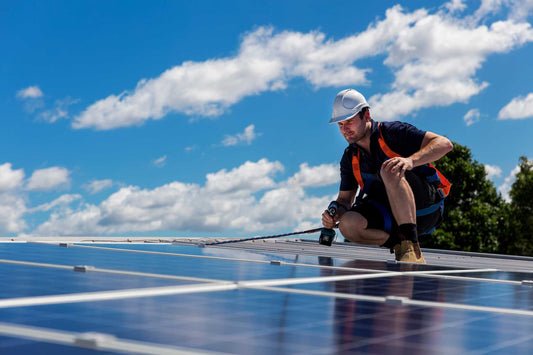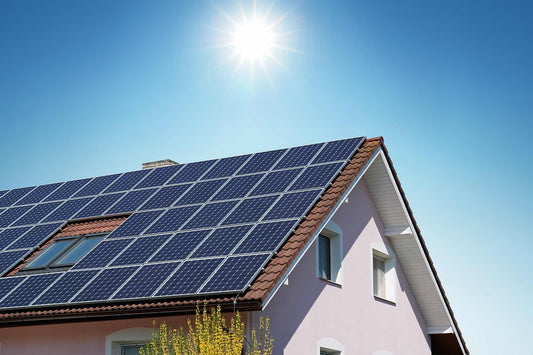Solar panels generally increase home value by an estimated 4.1%, or $4 per watt, on average.
Solar panels are a long-term investment. As such, there are quite a few forward-thinking considerations to make before installing them.
In addition to their return on investment (ROI) and their environmental impact, you’re probably wondering, “Do solar panels increase home value?”
You’ll be pleased to hear that generally, solar panels do increase home value as long as certain conditions are met, the most important being that the homeowner owns the solar panels rather than renting them via a leasing or PPA agreement.
In this guide, we’ll unpack several estimations of how much value they provide as well as the factors that can impact that value.
How Much Does Solar Increase Home Value?
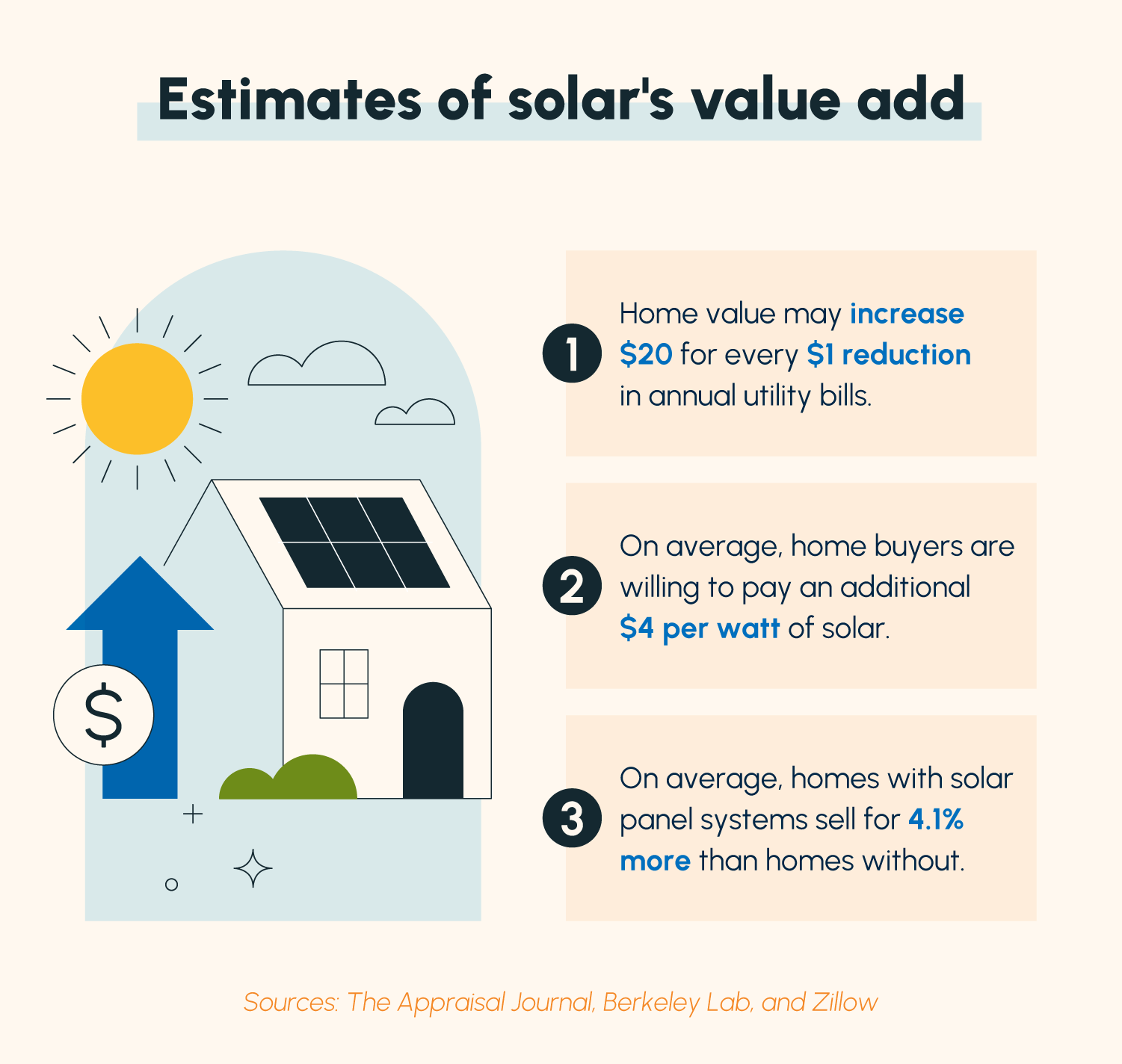
Several studies have been conducted to determine the impact that solar panels have on home value. Each one offers unique insight, so it’s important to take every estimate with a grain of salt. Let’s start with some older studies.
Study 1: Estimate based on utility bill reduction
In a study on home value throughout the 1990s, The Appraisal Journal estimated that home value increases $20 for every $1 reduction in annual utility bills. Along these lines, a homeowner who saves $1,000 per year from going solar would see their home increase in value by $20,000 as a result of their solar panels.
Of course, since this study analyzed a period starting three decades ago, the data may not be as reliable as data from newer studies. The following studies were conducted more recently and should provide a more accurate picture of solar panels’ impact on home value.
Study 2: Estimate based on system size
According to a study by Berkeley Lab analyzing home sales between 1999 and 2013, home buyers were willing to pay, on average, an additional $4 per watt of solar installed.
To estimate what various solar system sizes could contribute to home value according to Berkeley Lab’s study, refer to the table below.
| Solar system size | Approx. home value increase |
|---|---|
| 4 kW | $16,000 |
| 6 kW | $24,000 |
| 8 kW | $32,000 |
| 10 kW | $40,000 |
Study 3: Recent estimate based on location
The most recent study on this topic is from Zillow, which looked at home sales between 2018 and 2019. According to the study, homes with solar panel systems sold, on average, for 4.1% more than comparable homes without solar panel systems. Along these lines, a median-priced home in the U.S. would see its resale value increase by $9,274.
Of course, this number varies depending on where in the U.S. you’re located. In New York City, homes with solar generally sell for 5.4% more, whereas homes with solar in Los Angeles generally sell for 3.6% more.
Home Value Increase Calculation Examples
Let’s estimate how much value solar panels would add to a home based on each of the above studies’ findings.
- The average homeowner with a 6-kW solar system saves $1,500 per year on solar (about $37,500 over the system’s lifetime). According to The Appraisal Journal’s estimate, this homeowner’s home value would increase by $30,000 thanks to their solar system.
- According to Berkeley Lab’s study, a homeowner with a 6-kW solar system would see their home value increase by $24,000, or $4 for every watt of solar.
- According to Zillow’s study, the average home in Orlando (worth about $365,500 as of April 2022) would see its value increase by 4.6%, or about $16,800, thanks to a solar system.
Factors Affecting Solar’s Impact on Home Value
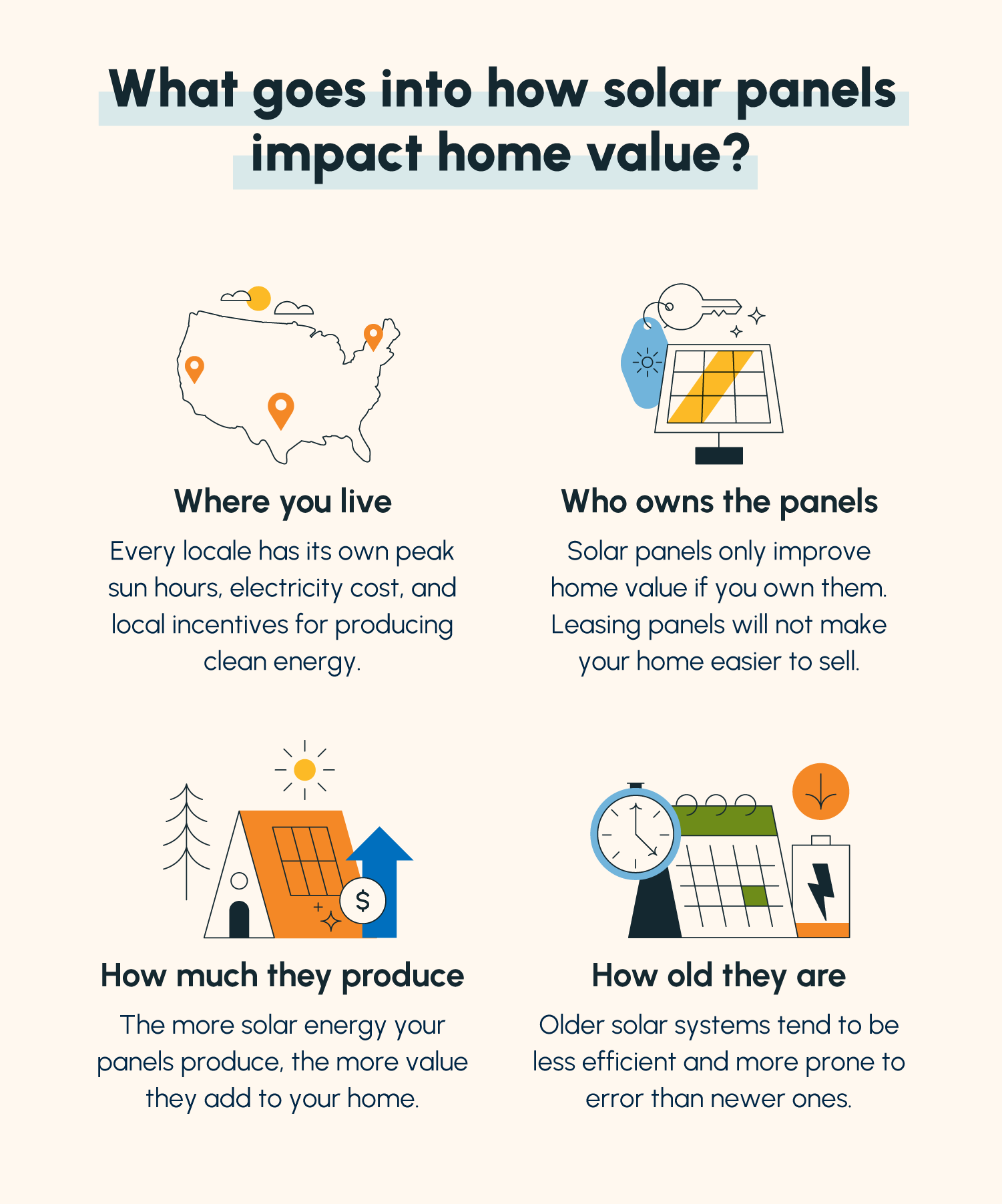
Not all solar panel systems affect home value in the same way. There are several factors that impact how much value they add, which we describe below.
Location
Where you live plays a key role in the impact solar panels have on your home’s value. For one, different cities receive a different number of peak sun hours and have varying electricity costs — two critical factors that affect the ROI of solar panels.
Different areas also offer different incentives for owning solar panels. These include statewide tax breaks, monetary incentives for generating certain amounts of renewable energy, or generous net metering programs.
Ownership
As we mentioned earlier, solar panels only add value to your home if you purchased the panels. Solar panels installed under solar leases and PPA agreements do not add value, and may even harm the resale value of your home.
If the contract is still active, many leasing and PPA companies require the new homeowner to enter into the contract. If the buyer wants to own their panels (rather than rent them through a lease or PPA), they may be less interested in buying the house.
System Output
For obvious reasons, system efficiency and output positively impact home value. As Berkeley Lab’s study made clear, every watt of solar counts, with each watt adding about $4 to the home’s resale value.
Essentially, the higher the quantity and efficiency of your panels, the more your home will be worth. The new buyer will likely be willing to pay a premium for more efficient clean energy production.
System Age
As solar technology advances, it becomes more efficient and powerful. For this reason, older systems that use outdated components aren’t worth as much as modern systems. Plus, newer systems mean less likelihood of malfunctions in the coming years.
How to Get More Home Value From Solar
Any enhancement you make to your solar system will improve your home’s resale value.
For example, since solar panels themselves can’t store surplus energy, installing solar batteries will ensure that extra energy collected during peak sun hours won’t go to waste. The appeal of energy storage that can be used at night is yet another selling point for prospective buyers.
If you drive a hybrid or electric vehicle, it’s a good idea to install an EV charging station that draws energy from your solar panels. This not only makes it easier to charge your vehicle with clean energy, but also adds value to your home itself.
Keep an eye out for innovative equipment that could upgrade your solar system and maximize its value.
Solar Panels’ Impact on Property Taxes
Property taxes vary based on a home’s value, meaning when you improve that value, taxes often go up with it. This may raise some concerns about the impact that installing solar panels will have on your property taxes.
Thankfully, many states would rather you install solar panels than let a property tax increase stop you, and therefore have implemented property tax increase exemptions for solar. See the table below (data courtesy of EcoWatch) to determine whether your state offers an exemption as well as the specifications of that exemption.
| Property tax exemption | States |
|---|---|
| 100% exempt | Arizona, Colorado, Connecticut, District of Columbia (D.C.), Florida, Indiana, Kansas, Louisiana, Mayland, Michigan, Minnesota, Missouri, New Jersey, New Mexico, Oregon, Rhode Island, Texas, Vermont, Wisconsin |
| 100% exempt for 20 years | Massachusetts |
| 100% exempt for 10 years | Montana |
| 100% exempt for 5 years | Iowa, New York, North Dakota |
| 100% exempt until 2025 | California |
| 80% exempt | North Carolina |
| Local exemptions | Alaska, Hawaii, New Hampshire, Ohio, Virginia |
| System-based exemption | Illinois, Nebraska, Tennessee |
| $50,000 or 70% of total property value | South Dakota |
| No exemption | Alabama, Arkansas, Delaware, Georgia, Idaho, Kentucky, Maine, Mississippi, Nevada, Oklahoma, Pennsylvania, South Carolina, Utah, Washington, West Virginia, Wyoming |
If your state doesn’t offer a property tax exemption, don’t fret. Remember, solar panels offer significant ROI via utility bill savings that will more than offset any potential increase in property taxes.
The Bottom Line: Do Buyers Want Solar?
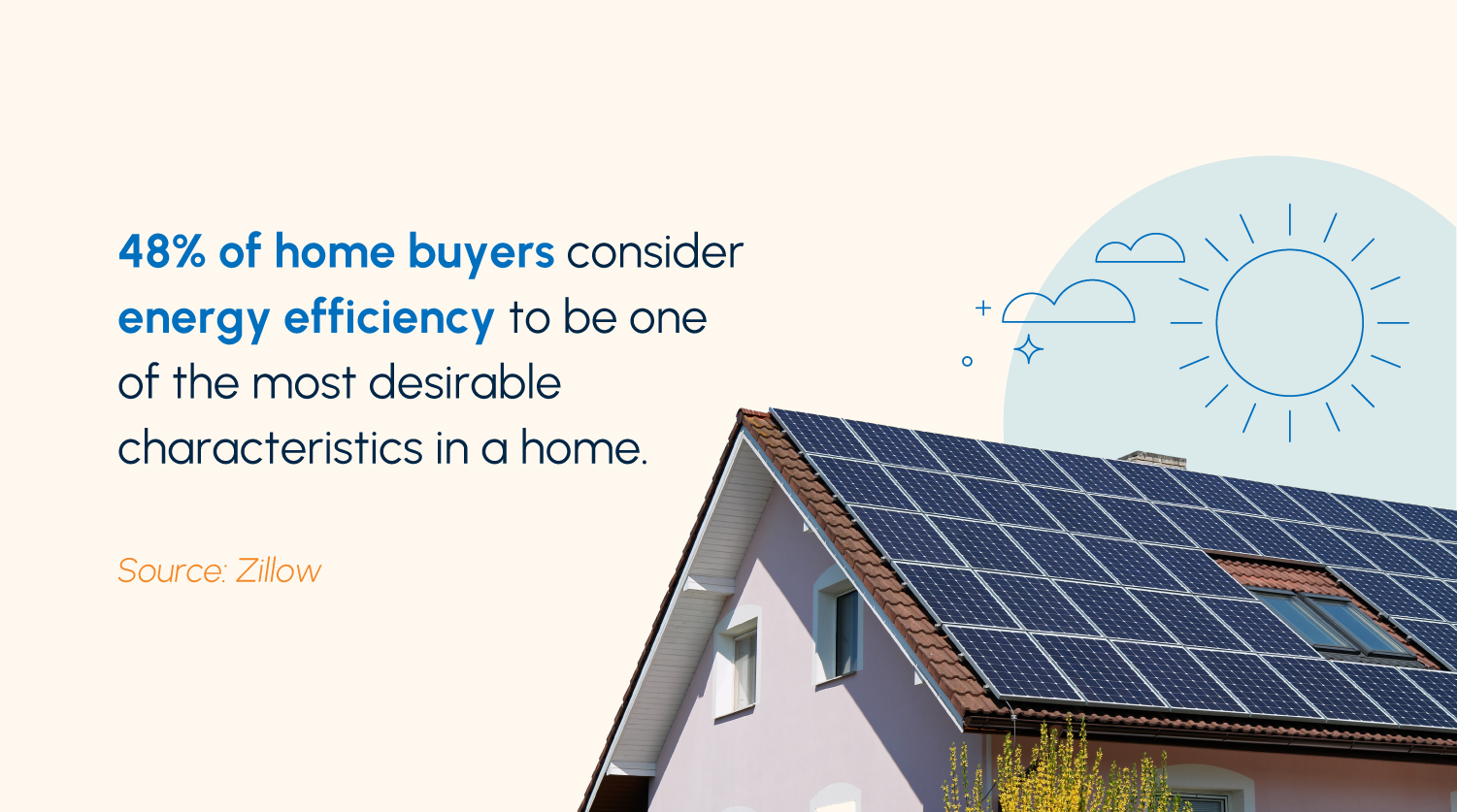
It’s clear that solar panels increase home value, but how much do buyers really care about them?
According to Zillow’s 2017 Consumer Housing Trends Report, nearly half (48%) of home buyers see energy efficiency as one of the most desirable characteristics in a home.
Since this only encompasses people who claim they would certainly be swayed by an energy-efficient home, there’s a good chance that solar will help you secure a buyer.
Earlier findings from the National Renewable Energy Laboratory back this up, showing that homes with solar panels tend to sell 20% faster than those without. While this data is outdated, it further supports buyers’ positive feelings toward residential solar.
Solar and Home Value FAQ
Solar panel installation is a big decision. If you aren’t sure how long you’ll be living in your current home and want to make sure solar panels won’t impede your efforts to sell it, you may have a few more questions. We address some common questions about solar’s impact on home value below.
Do Solar Panels Negatively Impact Home Resale Value?
No, solar panels do not hurt the resale value of a home. As long as the homeowner purchases rather than leases their panels, they improve resale value.
How Much Does Solar Add to Home Value?
According to Zillow, solar improves home value by 4.1% on average.
That said, estimates vary and are affected by a number of factors, such as location and system output. Take these factors into consideration when determining how much value a solar system adds to your home.
Do Larger Solar Systems Add More Value Than Smaller Ones?
System size correlates with home value, but this has nothing to do with the number of panels on your roof. Rather, it’s about energy output — the higher your system’s output, the more value your system adds.
If you want to maximize your solar system’s positive impact on your home’s resale value, aim for high-quality, efficient panels. Not only will this give you the biggest bang for your buck while you live in your current home, but it will also improve your home’s value on the market when you choose to sell it.
Ultimately, you can’t go wrong by investing in solar panels. They will only make your home more appealing to buyers and offer significant ROI via reduced utility bills.
As you plan out your system, remember to invest in quality. At Solartap, we partner with solar panel manufacturers that prioritize efficiency while keeping costs low. Equip your home with the very best solar panels today.


